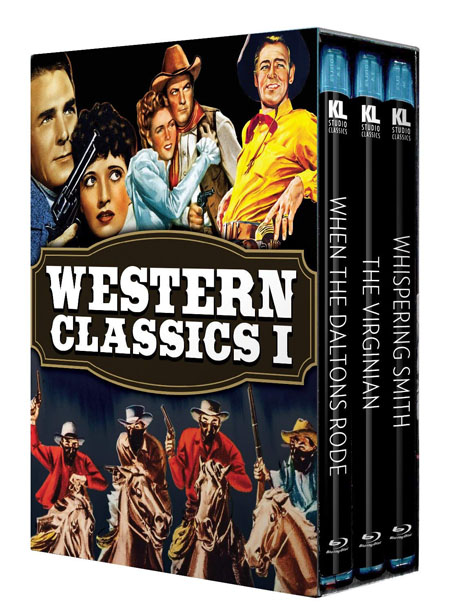
BY JOHN
M. WHALEN
There’s an old axiom often quoted by writers that once
you find a winning formula for putting stories together, stick with it. That
certainly must have been the case back in the 1940s when the films collected
together by Kino Lorber for its “Western Classics I†three disc box set were
made. “When the Daltons Rode†(1940), “The Virginian†(1946), and “Whispering
Smith†(1948) are all different movies, made by different writers and
directors, with different settings, characters and plots, but when all is said
and done they all basically tell the same story. Two guys who are pals have
their friendship strained when they both fall in love with the same woman. It’s
obviously a formula that worked.
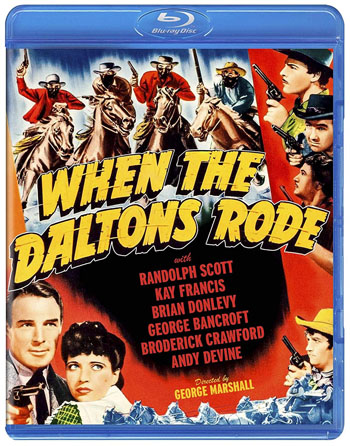
In “When the Dalton’s Rode,†Tod Jackson (Randolph
Scott) is a lawyer who comes west to set up his practice in Oklahoma, but finds
he’s needed more in Kansas where his old friends, the Daltons, live. The Dalton
family is having the kind of trouble that homesteaders usually have in these
flicks—land grabbers. Tod decides to stay in Kansas and help them out. He and
Bob Dalton (Broderick Crawford), especially, were good friends in their younger
days, and the romantic triangle in this movie arises from the fact that Bob is
engaged now to Julie King (Kay Francis). But when Tod meets her, it’s love at
first sight. Tod’s inner conflict between loyalty to Bob and his attraction to
Julie is played out against the background story of the Dalton’s fight with the
Kansas Land Development Company. Bob, Emmett (Frank Albertson,) Ben (Stuart
Erwin), and Grat Dalton (Brian Donleavy) are a wild bunch, and probably
responsible for all that grey hair in their Ma’s (Mary Gordon) head. So it’s no surprise when one of the men
working for the Land Development Company is accidentally killed in a fight with
the Dalton boys and Ben is charged with murder. When they bring him into court
for a speedy trial, the movie which had been pretty tame up to now, goes into
high gear.
The second half of the film’s 82-minute length is one
action sequence after another executed by a team of veteran stuntmen including Eddie
Parker and Bob Reeves. There’s a breakout from the courthouse, an attempted
lynching, a rescue of Emmett Dalton by Tod on buckboard, and a sequence of the
four Daltons stealing a stagecoach, pursued by a posse of about 20 men. The
Daltons jump off the front of the coach, unharness the horses pulling the stage
and lead the posse on a merry chase. This is followed by several more high
action scenes, including the Daltons leaping off a mountainside onto a passing
train and later jumping their horses off the moving train. Yakima Canutt shows
up in archival footage jumping a horse off a cliff into a river.
Director George Marshall and screenwriter Harold Shumate
used Emmett Dalton’s biographical novel as the basis for the film—a book that was
considered a complete whitewash of the Daltons—to create what is basically an
entertaining B-western that has as very little to do with the actual Dalton
gang. Do Randy and Kay find happiness? What do you think?
The Blu-Ray disc bonus features include audio commentary
by film historian Toby Roan and the theatrical trailer for the movie. Picture
and sound are good. While it’s not a restoration, the black and white
photography of Hal Mohr looks clean and textured.
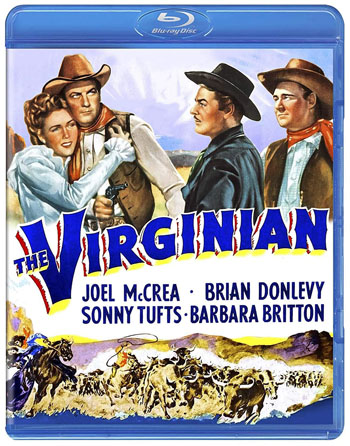
In “The
Virginian,†the title character (Joel McCrea), who apparently does not have
a real name and Steve Andrews (Sonny Tufts) are best buds, working as cowhands
on a cattle ranch in Medicine Bow, Wyo. They’re having a fine old time until
Molly Wood (Barbara Britton) arrives by train. She’s the new school teacher and
when she sees the Virginian herding some cows off the train tracks, she likes
what she sees. But Steve wastes no time moving in and offers to take her
luggage to the hotel. While Steve is lugging suitcases. Molly is startled by a
Brahma bull, and the Virginian rides to her “rescue.†The two cowboys spend the
rest of the movie trying to outmaneuver each other.
In “When the Daltons Rode,†the main complication was the
battle between the Daltons and the Land Development Company. Here instead of
land grabbing, the problem is cattle rustling. Cattle have been disappearing
off the ranches around Medicine Bow and the Virginian suspects a man named Trampas
(Brian Donleavy) is the one behind it all. Well, why wouldn’t he? He not only
wears a black hat, he dresses in black from head to foot. The Virginian’s also
a bit suspicious of his friend Steve who lately seems a bit too friendly with
the man in black. The plot draws these lines of tension to a final
confrontation when The Virginian must choose between friendship and adherence
to the Code of the West and possibly losing Molly’s affections. The penalty for
rustling is hanging.
This is the movie where Trampas calls the Virginian a
name and the Virginian draws his gun and tells him “Smile when you call me
that.†To which Trampas replies: “With a gun against my belly, I always smile.â€
Personally I thought it sounded better when Gary Cooper said it to Walter
Huston in the 1929 version made by Victor Fleming, but McCrea and Donleavy
aren’t bad. “The Virginian†has been filmed at least five times, going all the
way back to a silent version in 1914 by Cecil B. DeMille, starring Dustin
Farnum. Based on a classic western novel by Owen Wister, The Virginian was made
into a TV series in the 1960s, which is still running today on cable.
Kino Lorber’s Blu-Ray of “The Virginian†is very good in
terms of picture and sound, with colors bright and details sharp and clear. An
audio commentary by author/film historian Lee Gambin and actress/film historian
Rutanya Alda is provided on a separate soundtrack. The theatrical trailer is
also provided.
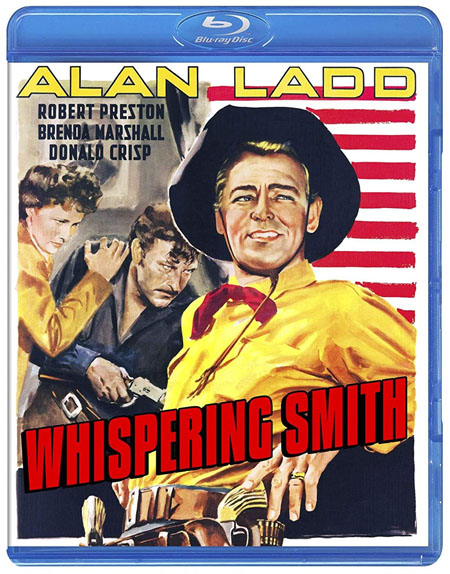
“Whispering Smith,†the third film in the
Kino Lorber collection, is like “The Virginian†another remake of a DeMille
film. The DeMille version was shot in 1926 with H.B. Warner in the role of the
railroad detective created by novelist Frank H. Spearman. In 1948 Paramount
mounted a new production, this time bringing the cool, and unflappable Alan
Ladd to the title role. Ladd had made a reputation as the laconic, ice-cold
hero of films like “This Gun for Hire,†“The Blue Dahlia,†and others. “Whispering
Smith†was his first shot at a starring role in a western.
Luke “Whispering†Smith is a railroad detective who
always gets his man. The railroad sends him to investigate a series of
derailments and lootings and in the process he reunites with (surprise!) his
old friend Murray Sinclair (Preston Foster), who works for the railroad, and
(ready for it?) Marian (Brenda Marshall), Murray’s wife. Of course,
“Whispering†and Marian were once snuggle buddies, but Murray prevailed and
“Whispering†rode off to chase railroad criminals. Now he’s back and the old
flame starts to flicker again as soon as “Whispering†and Marian lay eyes on
each other. Of course, “Whispering,†being the quiet, soft-spoken galoot that
he is, keeps his mind on his work and his feelings to himself and goes looking
for the varmints wrecking the trains.
Chief among those varmints is outlaw Barney Rebstock
(Donald Crisp) and his henchman Whitey DuSang (Frank Faylen). Faylen, who may
be best known for playing Dobie Gillis’s father on the old TV series “The Many
Loves of Dobie Gillis,†dominates this movie. As DuSang, he sports white hair
down to his shoulders, crooked teeth and dead-looking eyes. He steals all his
scenes from Ladd and Preston without even trying, he’s so odd looking.
“Whispering†starts to get concerned about his old buddy Murray, when he
discovers how friendly he is with Barney and Whitey. He grows more suspicious when
he sees the fine house he owns and how he seems to be doing pretty well
financially for a railroad worker.
There are further complications when the new railroad
manager George McCloud (John Eldredge) fires Murray for violating company
policy regarding disposal of goods taken from derailed trains. This sends
Murray off into a montage of train wrecks, and derailments with his superimposed
face and maniacal laughter booming out over the chaos. By now both “Whisperingâ€
and Marian know the truth about Murray. What to do?
Despite the unoriginal plot, “Whispering Smith†is a
good, entertaining western with solid performances by Ladd and Preston. It may
not be a “classicâ€, as so described by Kino Lorber, but it opened the door for
Ladd to play westerns and it wouldn’t be long before he’d star in “Shane,†which
is truly a Western classic.
One of the best features on this disc is the audio
commentary by film critic, author, and self-described bon-vivant Simon Abrams,
who provides lots of very interesting info about Ladd, his career, life and
personality. It’s worth listening to. There’s also a theatrical trailer. While Kino
Lorber’s Blu-Ray of “Whispering Smith†is good, on my 4K TV it appeared too dark.
All three of the films in this collection, for that matter, could use a good 2K
restoration to bring them up to today’s standards.
To sum it up, the three films in “Western Classics I†may
not exactly deserve to be called “classicsâ€, but they are all good films, well enough
presented and worth your time. We can assume from the title of this collection
there will be a “Western Classic II.â€
CLICK HERE TO ORDER FROM AMAZON
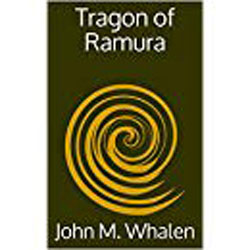
John M. Whalen is the author of "Tragon of Ramura". Click here to order from Amazon.
